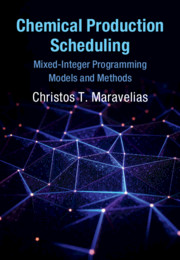Book contents
- Chemical Production Scheduling
- Cambridge Series in Chemical Engineering
- Chemical Production Scheduling
- Copyright page
- Dedication
- Contents
- Preface
- Part I Background
- Part II Basic Methods
- 3 Single-Unit Environment
- 4 Single-Stage Environment
- 5 Multistage Environment
- 6 Multipurpose Environment
- 7 Network Environment: Basics
- Part III Advanced Methods
- Part IV Special Topics
- Index
- References
5 - Multistage Environment
from Part II - Basic Methods
Published online by Cambridge University Press: 01 May 2021
- Chemical Production Scheduling
- Cambridge Series in Chemical Engineering
- Chemical Production Scheduling
- Copyright page
- Dedication
- Contents
- Preface
- Part I Background
- Part II Basic Methods
- 3 Single-Unit Environment
- 4 Single-Stage Environment
- 5 Multistage Environment
- 6 Multipurpose Environment
- 7 Network Environment: Basics
- Part III Advanced Methods
- Part IV Special Topics
- Index
- References
Summary
In this chapter, we discuss scheduling in multistage environments. The problem statement is presented in Section 5.1 and three types of models are presented in Section 5.2 (sequence-based), Section 5.3 (continuous grid-based), and Section 5.4 (discrete grid-based). In Section 5.5, we introduce an important new feature, namely, storage constraints. Again, we build upon the material covered in the previous chapters to model assignment and sequencing decisions, as well as other constraints such as release and due times.
Keywords
- Type
- Chapter
- Information
- Chemical Production SchedulingMixed-Integer Programming Models and Methods, pp. 128 - 146Publisher: Cambridge University PressPrint publication year: 2021



